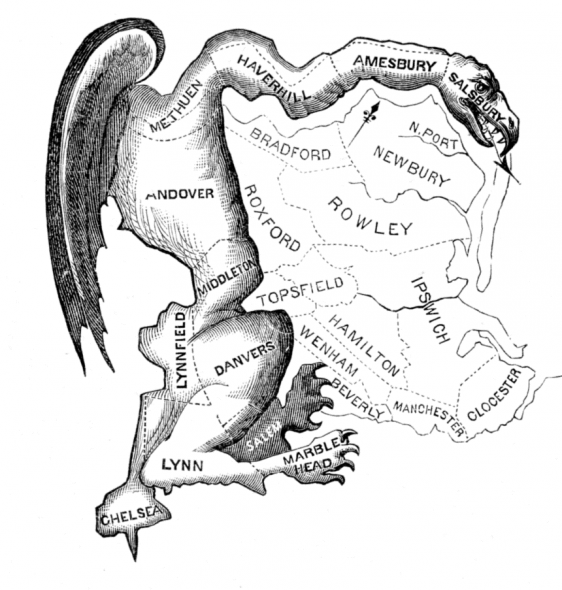Many Republicans Oppose Gerrymandering
Even in Wisconsin. But nearly all are former officeholders.
Three challenges to partisan gerrymandering are currently being considered by justices of the US Supreme Court:
- Gill v Whitford is a challenge to the Wisconsin gerrymander of state legislative districts aimed at assuring Republican control even if a majority of voters chose Democratic candidates. A panel of three federal district judges threw out the redistricting plan. Wisconsin Attorney Brad Schimel appealed this decision to the US Supreme Court. The Court heard oral argument in October and its decision is expected by the end of June. (annotated guide to case briefs)
- Beniske v Lamone is a Maryland case against a gerrymander by Democrats eliminating that state’s lone Republican-leaning US House District. A three-judge federal court put this challenge on hold until the Supreme Court rules on Gill. The Supreme Court has scheduled oral arguments on March 26. It is widely assumed that the court intends to decide this case along with Gill.
- Turzai v. League of Women Voters of Pennsylvania is a challenge to a Republican gerrymander of US House seats by the Pennsylvania legislature. The Pennsylvania Supreme Court rejected the gerrymandered districts and ordered a new district map. Mike Turzai, the leader of state Republican senators has appealed this decision to both the US Supreme Court and to a three-judge federal court panel. Since the state Supreme Court based its decision on the state constitution, his appeal is widely regarded as a stretch.
The Gill challenge, in particular, has generated enormous interest, as reflected in its 48 “amicus” briefs from individuals and organizations that are not affiliated with the parties in the case; 13 of the briefs supported Wisconsin’s redistricting and 32 supported the challengers to it. The remaining three were labeled as “in support of neither party,” although two of these—from redistricting experts—clearly supported the challenge.
One question to ask is to what extent do the amicus briefs interest reflect their partisan interest? In other words, if the Wisconsin gerrymander had been designed by Democrats with the aim of entrenching Democrats, how many of them would switch their position?
The partisan interest of the 13 amici supporting the Wisconsin Republican gerrymander is much more obvious in most cases. They include groups, such as the Republican National Committee and Republican State Leadership Committee, whose clear mandate is to win Republican seats. Others, although ostensibly nonpartisan, such as Wisconsin Manufacturers and Commerce and Judicial Watch, have a long history of supporting Republican candidates.
That leaves the Wisconsin Institute of Law and Liberty. It makes all the standard arguments against court interference with partisan gerrymanders. These arguments would certainly imply support of a Democratic gerrymander, but until it is put to the test we won’t know. If the Illinois districts, generally thought to favor Democrats, were challenged would WILL defend them?
A number of the amici challenging Wisconsin’s gerrymander come from current and former office holders, both Republican and Democratic. One, from 65 current and former state legislators, gives a snapshot of which states have a gerrymander and which party it favors. The ratio of red to blue in the chart below closely corresponds to the states’ bias. Wisconsin, Ohio, Pennsylvania, Michigan, and North Carolina have tried to entrench Republicans through gerrymandering, while Illinois, Rhode Island, and Maryland used gerrymandering to favor Democrats.
The amici also serve as a measure of the growth of partisanship in Wisconsin and nationally. As shown below, all of the Wisconsin Republican officeholders joining the 65 legislators opposing gerrymandering were former members of the legislature. Republicans who put democracy ahead of party are likely to face a primary challenger.
The same result is seen in another amicus, from 36 former and current US House members, 18 from each party. As shown below, to get 18 Republicans, the organizers needed to get former members of Congress, who no longer had to worry about their next election.
Other amici inadvertently tell the same story. One comes from 14 Republican statewide office holders, including Bob Dole, John Danforth, Richard Lugar, and Arnold Schwarzenegger. All but one—John Kasich—are former officeholders.
Several of the briefs from social scientists stress the harm that partisan gerrymandering does to the democratic system by accentuating the partisan divide and making it harder to solve society’s problems. “Safe” districts are often quite unsafe for officeholders who wish to work with people from the other party. Thus, partisan gerrymandering feeds on itself, giving voters less power in elections and damaging the ability of both parties to respond to the concerns of average Wisconsinites.
More about the Gerrymandering of Legislative Districts
- Without Gerrymander, Democrats Flip 14 Legislative Seats - Jack Kelly, Hallie Claflin and Matthew DeFour - Nov 8th, 2024
- Op Ed: Democrats Optimistic About New Voting Maps - Ruth Conniff - Feb 27th, 2024
- The State of Politics: Parties Seek New Candidates in New Districts - Steven Walters - Feb 26th, 2024
- Rep. Myers Issues Statement Regarding Fair Legislative Maps - State Rep. LaKeshia Myers - Feb 19th, 2024
- Statement on Legislative Maps Being Signed into Law - Wisconsin Assembly Speaker Robin Vos - Feb 19th, 2024
- Pocan Reacts to Newly Signed Wisconsin Legislative Maps - U.S. Rep. Mark Pocan - Feb 19th, 2024
- Evers Signs Legislative Maps Into Law, Ending Court Fight - Rich Kremer - Feb 19th, 2024
- Senator Hesselbein Statement: After More than a Decade of Political Gerrymanders, Fair Maps are Signed into Law in Wisconsin - State Senate Democratic Leader Dianne Hesselbein - Feb 19th, 2024
- Wisconsin Democrats on Enactment of New Legislative Maps - Democratic Party of Wisconsin - Feb 19th, 2024
- Governor Evers Signs New Legislative Maps to Replace Unconstitutional GOP Maps - A Better Wisconsin Together - Feb 19th, 2024
Read more about Gerrymandering of Legislative Districts here
Data Wonk
-
Chadha’s Shadow Over Wisconsin’s Legislative Veto
 Dec 25th, 2025 by Bruce Thompson
Dec 25th, 2025 by Bruce Thompson
-
The Red-State Coverage Boom That Congress May End
 Dec 19th, 2025 by Bruce Thompson
Dec 19th, 2025 by Bruce Thompson
-
Life Expectancy in Wisconsin vs. Other States
 Dec 10th, 2025 by Bruce Thompson
Dec 10th, 2025 by Bruce Thompson

























Career Politician Scott Walker and Wisconsin Republicans hate freedom. They hate democracy itself as well. That’s why they gerrymandered tje state and stole our voting rights. They are charlatans and schemers and we need to…you guessed it!
Dump Walker 2018!
Dump ALL Republicans 2018!
Just today, the Election Law Journal made a call for papers on partisan gerrymandering. They intend to dedicate an entire publication to it. And I intend, to submit an article for publication. Tentative title: “On the use of empirical bayesian methods to asses the durability of gerrymanders.”
Could have fooled me.
@David: touche. While the analysis is great and very unique, perhaps the title is … misleading?
It seems to make a probabilistic fallacy. While of the briefs submitted, all republicans who supported ending gerrymandering were retired congressmen, it is not also true that all republicans who signed onto a brief in defense of gerrymandering were NOT retired, and no republicans who were NOT retired spoke out against gerrymandering?
One could go on making Venn diagrams this way. The results would no doubt be disturbing.
But above all, and to your point, no sitting Republican congressman has uttered a word of admonition against gerrymandering.
But perhaps even more poignant, if you read all of the amicus briefs carefully, no congressman, sitting or non-sitting, Republican or Democrat, has ever implies that gerrymandering was something that should be tolerated.
Also notably absent not only from all briefs in support of defendsnts, but also all papers filled by defendants themselves, is any argument at all to the effect that it was not gerrymandered, or that it was not their intention to gerrymander.
These would seem like the obvious responses to any accusation of impropriety. And yet, out of literally 100s of pages written by – was it 32? – TEAMS of people – none of them made responded this way. There is not even a single mention of “we didn’t mean to” or “it isn’t” buried in the most un-read t poorly understood passages. They simply do not make that claim at all.
It is not gerrymandered, look at Senate 10th results. In Wisconsin there is always movement and always will be. The districts fit the rules laid out by court decisions. it is impossible to foretell how people will vote at any time. Look at Goldwater and Rragan/Nixon elections and how they change.
That isn’t exactly scientific WCD. There will always be movement? Wow. Will the sky always be blue?
So many fallacies. Don’t even know where to start. “There is movement therefore it’s not gerrymandered.” Sounds legit.
Please do give us some clear rules on how to identify a gerrymander and a specific example of one. So far we have:
* if it’s people move it’s not a gerrymander
* if the districts are ewual population it’s not a gerrymander
* if people don’t all vote exactly the same every election it’s not a gerrymander.
I guess I don’t see how anything can ever be a gerrymander then. Ehich is equivalent to saying “have at it. Tyranny is great. Down with democracy. “
You should write a brief in support of defendants, WAS. Your logic is on par with theirs.
Then why all the secrecy and how of silence and destroyed records by their law firm and state Republicans?
The Republicans base their maps on race.
You had to sign a secrecy form just to see the maps the GOP cooked up. That seems legit to you WCD?
The sky will always be blue therefore Wisconsin is not gerrymandered. Case closed. WCD missed his calling: he should have been a lawyer. Like I said, on par with the briefs in support of defendants.